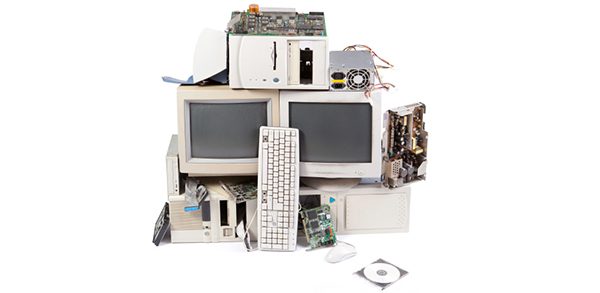
By Sophia Bennett February 20, 2014
Everyone is busy. With hectic schedules and so many things to do every day, it can be easy to start sneaking items into the trash rather than recycling them.
You should not let that happen with electronics. For one thing, many states have banned putting certain items with power cords or batteries in the trash. For another, there are lots of good reasons to keep these items out landfills. We can think of 10. Do you have other ideas? We would love to hear from you.
Recycling electronics keeps harmful products out of the environment
The list of harmful materials in electronics is long. Heavy metals like mercury and cadmium. Plastic coated with flame-retardants. Glass imbedded with several pounds of lead. These materials have detrimental health effects ranging from headaches and skin irritation, to damaging organs and causing chronic diseases. Who wants that floating around where people and wildlife can get into it?
Recycling puts valuable products back on the market
Electronics contain valuable commodities like copper, silver, gold and platinum. When electronics are recycled, all those materials are preserved and sent back to people who can use them. Bonus: Electronics recycling cuts down on mining, manufacturing and other practices that can harm local landscapes and put plenty of carbon in the atmosphere. A 2010 article in The New York Times says that for every ounce of gold miners remove from the earth, they move 30 tons of rock and sprinkle it with cyanide, which can easily find its way into local waterways.
Electronics recycling reduces the amount of waste going into landfills
Anything Americans can do to cut back on the amount of stuff they put in the ground is a positive thing. On average, we throw away 10 times our body weight worth of stuff every year — enough to literally bury ourselves. (Want more garbage facts? Check out this infographic from Think Progress.). It is much better to put these resources back to use than to let them sit in the ground.
Electronics recycling reduces the amount of waste going into incinerators
The only thing worse than thinking about all that waste going into a landfill is thinking about it going up a smokestack. Remember the list of toxic chemicals found in electronics? Scrubbers on incinerators will catch some of them, but most are likely to miss some (especially older incinerators). That means dangerous compounds are making their way into our air and, in turn, our lungs.
Recycling electronics creates jobs
A 2010 report by research company IDC says that the U.S. electronics recycling sector employs as few as 30,000 and as many as 45,000 people. These are well-paying jobs; according to the U.S. Bureau of Labor Statistics, a worker in the recycling industry is paid $19 on average. Recycling jobs are also likely to be full-time, which means workers (and sometimes their families) get benefits. Furthermore, the Institute for Local Self-Reliance shows that recycling 10,000 tons of computers creates 296 jobs (much higher than the average of 25 for all recycling sectors). Landfilling or incinerating the same amount of material creates one job.
Recycling electronics prevents women and children from ending up in dangerous working conditions
We have all seen them: horrifying pictures of women and children sitting on top of piles of old electronics, dismantling them with crude tools — no eye shields or other protective gear in sight. That is the reality for thousands of the world’s poorest people, who get our old cell phones and toasters dumped on them by unscrupulous importers. Sending your electronics to a qualified recycler in the U.S. will ensure they are taken apart responsibly and sold for reuse.
You could make money
Not on older products, like that brick phone or Mac Cube sitting at the back of your closet. But, many unwanted electronics do still have value. Newer-model iPhones and Galaxy phones sell for around $250. E-book readers can fetch more than $100. Stereo components go for several hundred dollars. If that electronic gear is still functioning, consider selling it. It is free and easy to post it on Craigslist or other sites.
Your school, church or nonprofit could make money
Funding Factory is one example of a program that will pay schools and charitable groups to collect high-value items like toner cartridges, cell phones and MP3 players. Check out their website for more details.
Recycling electronics provides equipment to people who need it
Low-income kids and children in poor countries get computers to help them learn. Disadvantaged people receive job training and a sense of dignity. Women affected by domestic violence get cell phones so they can call for help if they find themselves in danger. Putting reusable electronics back to use by donating them to worthy nonprofits helps millions of people every year. How could you not feel good about that?
Electronics provide raw materials for artists
Electronics make our lives easier, but in the hands of artists, they can also be beautiful. Here are some of our favorite examples:
- Theo Kamecke takes vintage circuit boards and turns them into stunning sculptures and other pieces of art.
- Telephone wire, which is coated in colorful plastic, is a great medium for sculptures, as evidenced here.
- A Canadian artist who goes by the name Fidi Kreativ crochets the tape from old VHS and cassette tapes to make really nice purses.